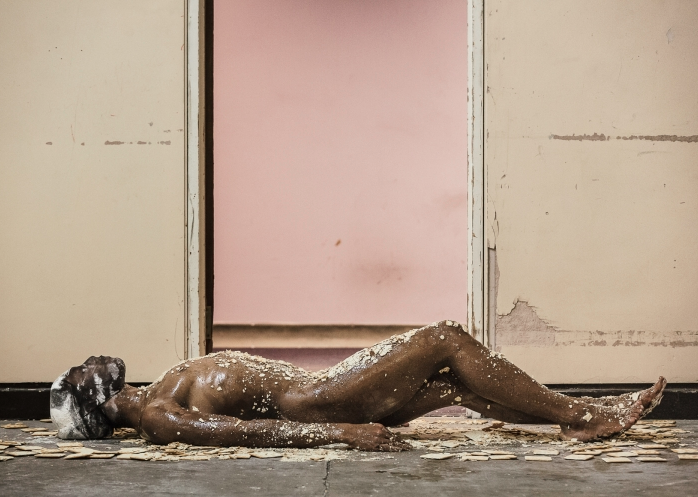by Julien Langevin
Through sounds of nylon ripping and glue dripping, “faggot sweat” seeping, a Formation-singing self-proclaimed “black effeminate punk” dances: in My Last American Dollar: Round 1. Tricking and Flipping Coins: Making Dollars Hit, Round 2. Black Angels in the Infield: Dripping Faggot Sweat, Round 3. Whatchu Gonna Do: Marvelous like Marva, Keijaun Thomas teaches her audience how to listen and resist. Thomas asks in her artist statement, “how do we resist temptation, how do we slow down, how do we play, how do we survive?” Her movements throughout the hour-long performance discuss what it means for people of color to create spaces for themselves, how to carry the “multiplicities of being young, gifted, and black.” Thomas’ in-progress performance at SPACE Gallery transformed the normally large and vast-feeling performance hall into an intimate and evocative space for speculation. Thomas creates a captive energy, abstractly describing situations that black femmes face in America, while also negotiating an environment to challenge power, time, and material.

Thomas utilizes mundane objects — glue, paper bags, nylon, string — to present time being savored and contained. The objects act as structures but also tools to create sequences of action. By structuring time through the utilization of glue pouring or string trailing, she takes her audience through a series of steps that come to represent different types of laborious occupations. Paper bags set up like a square race track around the room provide structure, a drafted area for action to take place. String becomes fencing when held between heavy cinder blocks for Thomas’ body to disrupt. Her body becomes objectified: a structure to inflict change, physical and intangible. Labor becomes regulatory when she performs — her body is accountable to the demands she is inflicting upon it. Banging on her chest or beating her hands on the floor expends bound energy. These objects are seen across Thomas’s performances in repetition, acting as tools to accompany the actions of her body. During her performances Thomas uses the objects to inflict change upon herself — or to ask an audience member to take charge. She exists in her queer space that she has created, her audience invited to watch, participate, and question.
![My Last American Dollar Studies, ]Performance S P A C E[ 6 days, 6 hours each day performance working with wood as a material, DRAWN exhibition in Folkestone, Kent in the UK, 2016, Photo by Manuel Vason](https://thechart.me/wp-content/uploads/2017/08/ThomasKz.jpg)
Accurate and empowering social depictions and representations of black bodies in contemporary culture are vital to the protection and conservation of black identities in America. While addressing notions of power, object-quality, and social ontology, Thomas incorporates contemporary pop culture references packed with rich cultural references. When Beyonce’s Formation plays overhead during Thomas’ performance, the room becomes alive at the recognition of Beyonce’s mesmerizing voice creating an access point for all in the room regardless of gender or ethnicity. However, they are also made to recognize the song as an anthem for black empowerment and prioritization. Proclaiming “we just might be a black Bill Gates in the making,” Thomas reiterates that Formation is a celebration of black culture, excellence, and vitality.
Keijaun Thomas performing Distance is Not Separation at the Hemispheric Institute. Video by the Hemispheric Institute.
“Neo slaves, slave femmes with no visible chains, enslaved, invisible goddess react.” Audio from Thomas’ written piece, “SHE’S HARD, SHE Q”, sounds overhead as she echoes key words. Words about femmes, black femmes, punk femmes, femme faggots: “she feeling faggody. She feeling fag-gody. She feeling fag-godessly.” Thomas confronts her audience with the intersections that create queer identities and the violence that they endure. A goddess warrior, nude and in charge, she struts around the blockade of paper bags, string, and concrete she has created. Beating on her chest, face and legs, she reminds her audience of the physical matter of her body. She contorts it, invites members of her audience to pour liquids on it, twerks it, stretches it. When she pauses or when the music stops, the congregation is reminded that she is in control. Keijaun Thomas is the influence, the audience made to be malleable observers. Thomas’ performance unpacks ways that black femme bodies and trans femme bodies are utilized, commodified, and contextualized in our culture. She reforms the view of black femme bodies and asks her audience to consider their positionality in relation to those whom our culture does not prioritize. Thomas demands that white people take responsibility for the oppression of black femme people in America, ending her performance referencing Alice Walker’s The Color Purple: “until you do right by black people, everything you think about is going to fail.”
Keijaun Thomas performed My Last American Dollar: Round 1. Tricking and Flipping Coins: Making Dollars Hit, Round 2. Black Angels in the Infield: Dripping Faggot Sweat, Round 3. Whatchu Gonna Do: Marvelous like Marva at SPACE Gallery on Friday, July 21, 2017. Thomas was artist-in-residence at SPACE Studios from July 9–22, 2017.
SPACE Gallery
538 Congress Street, Portland, ME | 207.828.5600
Gallery hours are Wednesday through Saturday 12–6pm, or by chance or appointment.

Julien Langevin is a critical artist, activist and writer based in Portland, Maine. His current artistic interests involve the construction of self, gender, and perception. Ongoing political interests involve destroying the kyriarchy.

